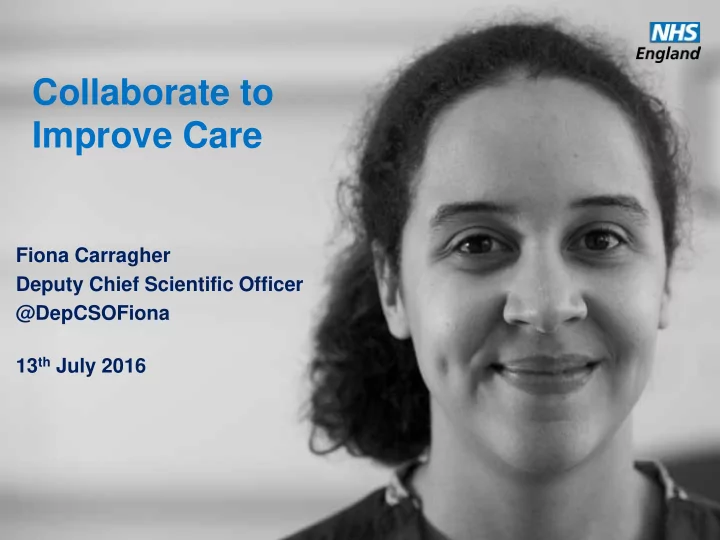

Collaborate to Improve Care Fiona Carragher Deputy Chief Scientific Officer @DepCSOFiona 13 th July 2016 www.england.nhs.uk
The ‘triple aim’ for the future NHS Health & Care and wellbeing gap Quality Gap - Preventing morbidity - Improving - Reducing inequality identification and between various management of communities patient conditions, making the most of the There is currently: opportunities available • inequitable access to diagnostics & scientific services Funding & efficiency gap • variable quality in delivery - Ensuring effective sustainable • commissioning fails to link to services given social and the value proposition demographic change www.england.nhs.uk
Requirements for the future NHS • Improving integration of services – breaking down barriers between services and developing new integrated structures • New structures for delivering care • Improving the NHS’s ability to undertake research and innovation & raising the game on health technology • More investment in primary care • Patients have greater control of their own care • Radical upgrade in prevention and public health www.england.nhs.uk
Healthcare Scientists Physical Sciences and Lab/Pathology Sciences Physiological Sciences Biomedical Engineering • Analytical Toxicology • Audiology • Anatomical pathology • Autonomic neurovascular function • Biomechanical engineering • Blood transfusion • Cardiac physiology • Clinical measurement & • Clinical perfusion science science/transplantation Development • Clinical biochemistry including • Critical care science • Clinical Pharmaceutical Science • Gastrointestinal physiology paediatric metabolic • Diagnostic radiology & MR physics • Neurophysiology biochemistry • Equipment management & clinical • Clinical genetics/Genetic • Ophthalmic and vision science engineering • Respiratory physiology Science • Medical electronics & • Clinical embryology & • Urodynamic science instrumentation • Vascular science Reproductive Science • Medical engineering design • Clinical immunology • Clinical photography • Cytopathology including • Nuclear medicine Bioinformatics including cervical cytology • Radiation protection & monitoring • Electron microscopy • Radiotherapy physics • Clinical Bioinformatics and Genomics • External quality assurance • Reconstructive Science • Computer science and modelling • Haematology • Rehabilitation engineering • Specialist Health Informatics & analysis • Haemostasis and thrombosis • Renal dialysis technology • Clinical Immunology • Ultrasound & non-ionising • Histocompatibility & radiation immunogenetics • Histopathology These specialisms are found across the health and social care system in • Microbiology the UK inclusive of the NHS, Public Health England and NHSBT and in the • Molecular pathology of private & third sector delivering NHS services for patients acquired disease • Phlebotomy Many of these specialisms have important links with the other • Tissue banking professional areas, with some staff having joint registration
The NHS –a service built on science and technology 1958 : First 1971 : diagnostic 2002 : first 1987 : First digital First ultrasound successful gene hearing aid CT scan machine therapy 1962 : 1978 : First IVF Successful baby total hip replacement 1950 1960 1970 1980 1990 2000 2010 1980 : First full 1985 : PCR and 2010 : First bilateral 1995 : introduction body MR scan cochlear implant automated DNA of medical lasers 1958 : sequencing Vaccination programme for polio & diphtheria An indicative selection from the last 68 years
Science and technology- crucial for the future
…Be Innovative • Bring your ideas to the table • Think creatively • Collaborate with clinical colleagues, industry, academia • Who else can you learn from ?
… how you can make a difference to others?
…Take your place in the team
And be fearless ! • Think about how you can make a difference • Be confident so your voice is heard • Say yes to opportunities • Others may come with you
Enthusiasm is contagious! • Break the stereotype • Have passion and commitment • Think about how you can play your part in this challenge • Bring your skill, expertise, creative minds to the problems raised
Recommend
More recommend